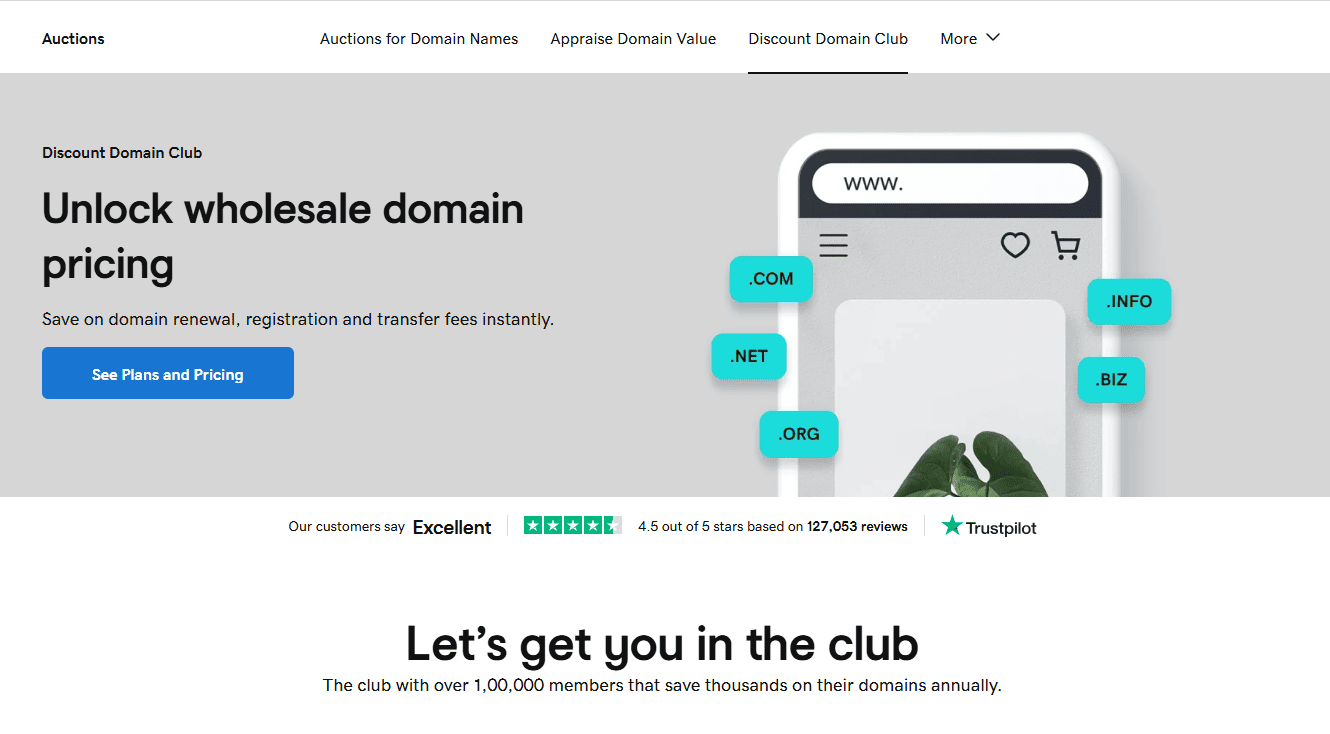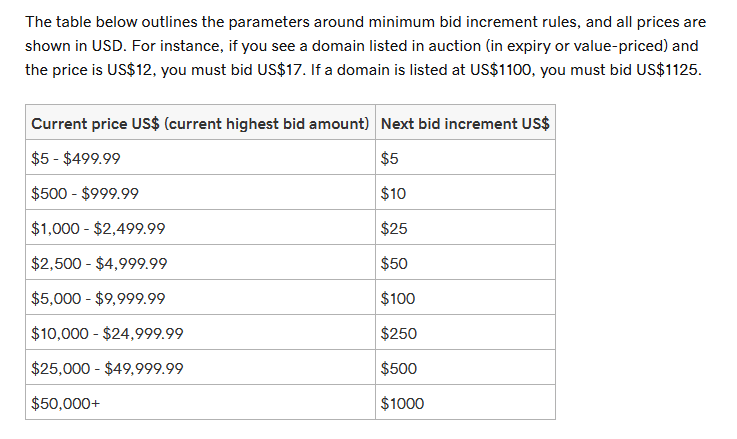Like many domain investors and entrepreneurs, I eventually found myself drawn to the massive domain marketplace known as GoDaddy Auctions.
As a user of GoDaddy’s other services, I knew they were a popular choice for good reasons: they offer a vast range of domain extensions, from the classics like .com to niche options like .tech, and manage their platform with a user-friendly interface.
However, using the auction platform is a different story entirely. My goal was simple: to snag a high-value, existing domain name without paying a hefty price. So, here is my honest GoDaddy Auctions review, starting with the fundamentals of how the platform operates.
First Things First: How Does a GoDaddy Auction Work?
Before I could even place a bid, I realized that access to the real action is gated.
The GoDaddy Auctions Membership

GoDaddy Auctions Discount Domain Club
You absolutely need to join the Discount Domain Club (which includes the Auctions Membership) or purchase the Auctions Membership separately for an annual fee. This fee is non-negotiable if you want to participate in the bidding, especially on expired domains. This membership is what gives you access to bid and sell domains, utilize the “Buy It Now” option, and add domains to your Watchlist.
The Seven Types of Listings
I quickly learned that the term “auction” covers many different types of sales on the platform. It’s not all just last-minute bidding wars. Understanding all these categories is important for finding the right domains.
The seven primary types of auctions available are:
| Auction Type | Focus | Key Feature |
| 1. Expiring Auctions | Domains whose owners failed to renew. | Last for a limited period, often 7 days. The highest bidder wins before it’s released to the public. |
| 2. Public Auctions | Domains listed by private sellers. | Typically run for 7 days, starting with a minimum bid. |
| 3. Public Buy Now | Fixed-price domains. | You purchase it immediately at the listed price, bypassing the bidding process entirely. |
| 4. Closeout Domains | Unsold domains from Expiring Auctions. | Deeply discounted prices, sold on a first-come, first-served basis. |
| 5. Value Priced Domains | Expired domains with lower perceived value. | Priced affordably for personal or small business use. |
| 6. Offer/Counter-Offer | Negotiable sales set by the seller. | The seller sets a reserve price; you submit an offer they can accept, reject, or counter. |
| 7. DomainConnect | Domains ready to link to third-party services. | Streamlined transfer process designed for quick setup with website builders or email services. |
Using Filters: A Necessity, Not a Luxury
The huge number of domains listed can be overwhelming. Since I didn’t want to waste hours scrolling, I relied on filters to narrow things down. GoDaddy’s filtering options are very flexible, which is a big plus:
- Keywords: exact match, contains, begins with, or ends with
- Price: set your minimum and maximum budget
- Domain Age: helpful for finding established domains
- Traffic: filter for domains with existing estimated traffic
- Extensions: choose specific ones like .com or .net
If you skip the Advanced Search filters, you’ll end up lost in thousands of irrelevant results. For me, combining a keyword search with a minimum domain age filter made the search much more effective.
The Bidding Process and “Sniping”
When you do bid, you have two options: a standard bid or a Proxy Bid.
The Proxy Bid feature is fantastic. You set your maximum limit, and the system automatically bids in small increments until that limit is reached.
However, be warned about the auction extension (or “extended bidding”). GoDaddy tries to prevent “sniping” (placing a final bid in the last seconds). If a bid is placed near the end of the auction, the clock is automatically extended by a few minutes. This ensures a fair shot for all bidders, but it also means what you thought was the final minute can quickly turn into a prolonged, tense bidding war.
Here are the bid increment rules for bidding on GoDaddy:

Bid increment rules on GoDaddy Auctions
GoDaddy Auctions Review: Commission, Winning, and the Hidden Costs
Once you learn how to bid, the next big concern is the money: what fees am I really paying, and what happens once I get that “Congratulations, you won!” email?
What is the Commission on GoDaddy Auctions?
As a buyer, I was primarily interested in the final price I had to pay. Unlike many platforms where the buyer pays a direct commission, here the commission is chiefly a seller expense:
In other words, the seller of the domain is the one who pays a percentage (usually 15% to 25%) of the final sale price to GoDaddy for using their platform.
However, for the buyer, there is a mandatory added fee:
The final bid price is not your final cost. I always had to factor in the cost of a one-year renewal or transfer fee, in addition to the winning bid. While this is standard practice (you must register the domain in your name somehow), it’s an additional cost that can catch new buyers off guard, especially for low-value domains.
What Happens If I Win a GoDaddy Auction?
The excitement of winning is quickly replaced by a bit of waiting. From my own experience buying an expired domain, here’s how the process usually goes:
- Immediate Payment: You get a short window, usually around 48 hours, to complete the payment. If you don’t pay in time, GoDaddy might automatically charge your saved payment method or you could lose the domain altogether.
- The Transfer Delay (The Tough Part): This is where patience really matters. With expired domains, the transfer doesn’t happen right away.
As one Reddit user pointed out, there’s a notable grace period involved:
“Here’s something I didn’t notice before because it’s pretty hidden — the previous owner still has the option to buy the domain back for about 14 days, even after it’s been auctioned off. Luckily, they didn’t.”
GoDaddy must complete the entire expiration process before transferring ownership. The domain may take anywhere from 5 to 20 days to appear in your account, especially with expired domains. This delay can be frustrating, but it’s a normal part of how the system works when domains are newly abandoned.
My Experience: Buying a High-Value Expired Domain
I can personally attest that the platform works for high-stakes purchases. I was looking for a domain that was a key piece of intellectual property that a previous owner had let lapse.
The Bidding Strategy: My plan was similar: place a large proxy bid near the very end. The price shot up quickly, but knowing my maximum true value beforehand helped me avoid overpaying in the heat of the moment.
The Uncertainty: I also shared the same open question: were the other bidders real? Given that the platform makes money on the high sale price, there’s always a lingering suspicion. However, the system ultimately delivered the domain I needed, providing massive value by settling a key branding issue, making the process worthwhile.
What are the Disadvantages of GoDaddy (And the Auctions Platform)?
While I ultimately got the domain I needed, my experience with the platform and the company as a whole wasn’t without its major headaches. It’s important to address the drawbacks that many users, including myself, have experienced.
1. The Shockingly High Renewal Costs
The biggest, most widely-cited disadvantage of using GoDaddy, whether for an auction domain or a regular registration, is the pricing structure.
- Introductory vs. Renewal: GoDaddy often reels you in with fantastic promotional rates for the first year. But I learned quickly that after the first year, the price jumps significantly. This is true for registration, and it’s especially true for add-ons like WHOIS privacy protection, which other registrars often include for free.
- The “Rope-In” Tactic: It’s surprising how GoDaddy “ropes you in for the long run.” You get comfortable with the easy-to-use interface and the convenience of having everything in one place, only to be hit with much higher, sometimes unaffordable renewal fees down the line.
2. Aggressive Upselling Tactics
From the moment I checked out with my winning domain, I was constantly bombarded with offers.
- The Checkout Maze: The buying process feels unnecessarily long and clearly designed to make you click “Yes” on add-ons you don’t need. You’ll see prompts for hosting, SSL certificates, and different security packages. It’s frustrating and can feel overwhelming, especially for casual users.
- The Ecosystem Trap: GoDaddy aims to be an all-in-one platform, offering everything from email marketing to website builders. The downside is that the experience often feels cluttered because you’re constantly being pushed toward another paid service.
3. Scam Risks and Issues with “Buy Now” Listings
My most serious concern stems from the non-bidding listings, specifically the Public Buy Now and Offer/Counter-Offer domains, which often include high-value names.
I saw reports and stories that detail a big risk when GoDaddy itself doesn’t immediately possess the domain. Here’s what one Reddit user shared about the platform:
“Beware godaddy domain auctions –total scam… I purchased a domain from GoDaddy Auctions. It wasn’t a bid, but rather a straight purchase… after a couple weeks and no delivery, I contacted them to find out where the domain is. They tell me they are having problems contacting the seller…”
- The Seller Contact Problem: The issue is that many of these listings rely on a third-party seller to unlock and transfer the domain manually. If that seller is unresponsive or difficult to reach, you are left waiting indefinitely, or worse, facing a company that initially refuses a refund.
- The Refund Nightmare: The Reddit story above reveals a highly concerning practice: a customer who never received the domain was told, “We don’t give refunds on premium domains.” Whether the domain was “premium” or not, not receiving a paid-for product is unacceptable. This level of shadiness and difficulty in getting a simple refund forced the customer to file a credit card dispute, a clear sign of poor business practice.
Final Verdict: Is GoDaddy Auctions Worth It?
Yes, but you must be a savvy user.
If you are a serious investor or a business that absolutely needs a specific, high-value domain, GoDaddy Auctions provides the scale, variety, and filter tools necessary to find it. My own success story of acquiring a key domain proves that the platform works when a binding auction is completed successfully.
However, my advice is to proceed with extreme caution:
- Budget for Renewals: Never base your domain budget on the first-year price. Know what the full, annual renewal price is before you buy.
- Stick to Expiring Auctions: While not a guarantee, I found the Expiring Auctions (the 7-day public bidding wars) to be the most secure way to buy, as the domain is already in the expiration pipeline and is less reliant on a flaky third-party seller.
- Watch the Upsells: Click “No Thanks” repeatedly. You don’t need 90% of the add-ons they push on you during checkout.
If you can navigate the aggressive sales tactics and manage the long transfer waiting period, GoDaddy Auctions is an undeniably powerful tool in the domain investor’s arsenal.
 DomCop
DomCop